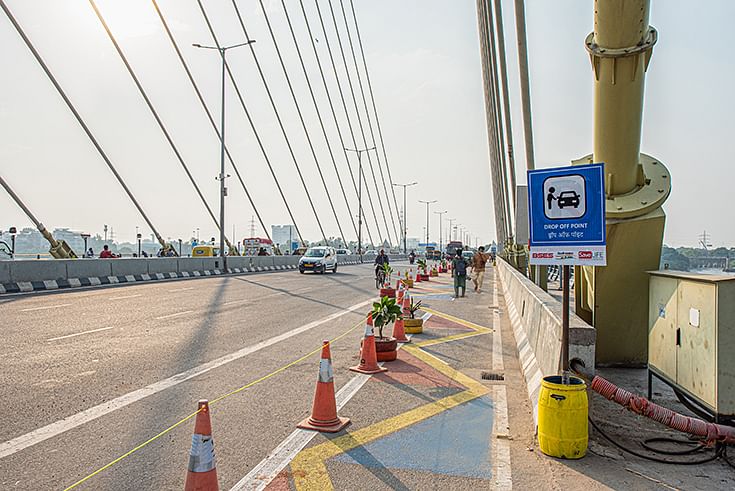First-ever Tactical Urbanism Trial on a bridge in India conducted in New Delhi
Between 2018 and 2021, the Signature Bridge, which is also a tourist attraction, witnessed 53 road crashes and 17 fatalities.
To save lives and make Delhi roads safe for all, the SaveLIFE Foundation (SLF), with support from BSES Yamuna Power and in close partnership with the Delhi Traffic Police, Delhi Transport Department, PWD (Central and Northeast) and Delhi Tourism and Transportation Development Corporation (DTTDC), has launched a Tactical Urbanism Trial at the Signature Bridge in New Delhi. Between 2018 and 2021, the Signature Bridge witnessed 53 road crashes and 17 fatalities.
Inaugurated in November 2018, this cantilever spar cable-stayed bridge is India’s first asymmetrical cable-stayed bridge. Launched as both a tourist attraction and a means of reducing travel time for commuters plying between north and northeast Delhi, the Signature Bridge connects Wazirabad across the Yamuna to the inner city.

What are Tactical Urbanism trials?
Tactical Urbanism (TU) trials are temporary, quick and relatively low-cost interventions, which test out urban design, transportation planning and infrastructural changes for improving road safety for all road users, especially the most vulnerable, like pedestrians, cyclists and other non-motorised transport users. Once the interventions are proven, the relevant government agencies are expected to make them permanent.
As part of its Zero Fatality Corridor (ZFC) initiative, SaveLIFE Foundation tests temporary urban design interventions to improve safety of pedestrians, cyclists and other road users. An essential component of these trials is road space redistribution to ensure modal equity, road geometrics modification, traffic channelisation, vehicular speed reduction, and the addition of pedestrian and cyclist safety infrastructure.
The Tactical Urbanism Trial undertaken at the Signature Bridge includes the introduction of nine sets of Transverse Bar Markings (TBM) along the main carriageway of the bridge as a speed-calming measure. Made of thermoplastic markings, TBMs force motorists to reduce speed through a rumbling effect felt while they drive over them. Each set of TBMs comprise six bars that are 150mm wide, 300mm apart, and 5 to 7.5mm high.
In addition to the TBMs to reduce the speeds at the Approach/or Interchange Ends of the Signature Bridge, the Tactical Urbanism Trials also include the narrowing of merging and diverging angles and approach lanes, for the reduction of conflict points at the site. This month-long trial will end on November 6.
Speaking about the need to support such interventions, Jasmine Shah, Vice-Chairperson of the Dialogue and Development Commission of Delhi, said, “Road safety is a critical public safety issue and the Delhi government is committed to continuously finding unique, innovative solutions for the same. The trials so far have proven that such low-cost solutions can have a significant impact by reducing the number of road crash fatalities on target sites and stretches to zero."
He added, "Signature Bridge is an architectural landmark in India, it should also become a benchmark for road safety across India. The 'Tactical Urbanism' approach especially focuses on safeguarding the most vulnerable road users like pedestrians, cyclists and other two-wheeler riders. By testing out and scaling up effective urban design, transportation planning and infrastructural changes, such as this under the ‘Dehi@2047’ initiative, we will be enhancing road safety for all road users."
Elaborating on the road safety situation at the Signature Bridge, Chandra Kumar Singh, DCP, Traffic (North and Central District), said, “Ever since its inauguration, the Signature Bridge has experienced a high level of over- speeding, especially of goods/ commercial vehicles and two-wheelers. The speed limit in this section is 40kph for HCVs and 60kph for cars. This unsafe road practice has been witnessed both during the day hours as well as night time leading to multiple road crashes and fatalities as per the FIR data shared by SHO Timarpur Tribhuvan Negi. The reduction of speed through the additional speed-calming measures put in place during this trial will help reduce over-speeding and make the stretch safer for all road users visiting the Bridge. It is important that motorists take cognisance of these speed calming measures and signages and use them correctly for a safer commute for all.”
Piyush Tewari, CEO, SaveLIFE Foundation said, “Road crashes are a significant cause of death and disability in India. SLF’s Zero Fatality Corridor model employs data and evidence to ascertain the best possible solution for saving lives by minimising road crashes and consequent fatalities. Proven solutions are shared with the Government to make them permanent and replicate them. We are grateful to BSES Yamuna Power Limited, Delhi Police, Delhi Transport Department, PWD (Central and Northeast) and DTTDC for working with us towards improving road safety in Delhi.”
This redesigning has led to an 83% increase in Safe Pedestrian Zone/or Public Realm at and around the Signature Bridge. This is the fifth Tactical Urbanism Trial in New Delhi, with the four previous ones conducted at Bhalswa Chowk, Rajghat Intersection, Gandhi Vihar and Burari Chowk. The Tactical Urbanism Trial at the Rajghat Intersection reduced pedestrian conflict by 32% and vehicular conflict by 81%. Similarly, at Bhalswa Chowk, the Tactical Redesigning led to a 50% reduction in pedestrian conflict with fast-moving traffic. At Burari Chowk, the intervention resulted in reduction of pedestrian exposure distance by 51% and exposure time by 52%. Based on the findings of these trials, permanent interventions have been suggested to the civic agencies.
RELATED ARTICLES
Cosmo First diversifies into paint protection film and ceramic coatings
The Aurangabad, Maharashtra-based packaging materials supplier is leveraging its competencies in plastic films and speci...
JSW MG Motor India confident of selling 1,000 M9 electric MPVs in first year
The 5.2-metre-long, seven-seater luxury electric MPV, which will be locally assembled at the Halol plant in Gujarat, wil...
Modern Automotives targets 25% CAGR in forged components by FY2031, diversifies into e-3Ws
The Tier-1 component supplier of forged components such as connecting rods, crankshafts, tie-rods, and fork bridges to l...






 By Autocar Professional Bureau
By Autocar Professional Bureau
 14 Oct 2022
14 Oct 2022
 5167 Views
5167 Views




























